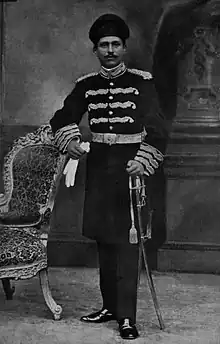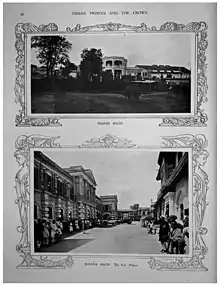Moin-Ud-Daula Bahadur
Amir-e-Paigah-e-Asman Jahi, Moin-ud-Daula Bahadur Innayath Jung, commonly known as Sir Nawab Muhammed Moin Uddin Khan born at Basheer Bagh Palace in 1891 was an Indian nobleman and member of the Paigah Nobility and the Amir of the Asman Jahi Paigah one of the 3 great Paigahs of Hyderabad State[1] The Paigah Nobility was the second most powerful family in Deccan Hyderabad State maintaining their own court and army bound with Asaf Jahi dynasty by matrimonial relationship, Moin-ud-doula and his father Asman Jah was one of those fortunate individuals to whom it has been given by fate to write their names large in the annals of their country, Moin-ud-doula's father Asman Jah who served as co-regent and Prime Minister of Hyderabad created several marvelous architects throughout the city maintained his army court in his domain Shamshabad, was granted the title of Order of the Indian Empire,
Moin-Ud-Daula Bahadur | |
|---|---|
 | |
| Born | Nawab sir Muhammed Moinuddin Khan 15 June 1891 |
| Died | 25 September 1941 (aged 50) |
| Resting place | Paigah Tombs |
| Education | MEC |
| Successor | Nawab Zaheer Yar Jung |
| Children | Nawab Ifteqar uddin Khan, Nawab Iqbal Uddin Khan, Nawab Badar Uddin Khan |
| Parent |
|
| Relatives | Osman Ali Khan (Cousin) Sultan-ul-Mulk (Cousin) |
| Family | Paigah family |
| Awards | Delhi Darbar Silver 1911, Silver Jubilee 1935, Coron 1937, Nizam Silver Jubilee 1937 |
Moin-ud-Daula was educated at Nizam College MEC, he was the Minister of Industry from 1923–1924 and later retired to join the army of the Asaf Jahi dynasty as army deputy From 1924–1927. He was granted the title of Innayat Jung in 1919 and the title of Amir-e-Paiagh Asman Jahi in 1927, Paigah Amirs held the honorary monarchal (standard) behind the Nizam. Moin-ud-Daula was one of the most trusted close allies of Mir Osman Ali Khan he was also part of the Executive Council of H.E.H. the Nizam of Hyderabad, he was also adviser and counselor to Nizam and he was the only person to have his court, army, and domain he also possed the largest estate in the entire state of Hyderabad State formally known as Deccan 2nd to non but Nizam, Moin-ud-was also one of the richest nobles in the east at that time, tales of his father's achievement and wealth are well known and his loyalty to the Asaf Jahi dynasty, there countless book in which it is described by Noble Englishmen about both Moin-ud-Daula and his father Asman Jah as exceptional people of noble character and people of sincerity, piety, and honor,
Career
Nawab Moin-ud-Daula Bahadur founded Moin-ud-Dowlah Gold Cup Tournament he was very fond of cricket and founded Patron Hyderabad Cricket Association 1934-1941.he was also President of Saroornagar Cricket Club, and was honored with K.C.I.E after serving in the Asaf Jahi dynasty army.
he was the Minister of Industry from 1923–1924 his contribution to the education system and business industry is greatly appreciated.
Medal of Honour
Nizam’s Silver Jubilee (1937)
Delhi Durbar Silver (1911)
Silver Jubilee (1935)
Coron (1937)
Estate and Palaces
Basheer Bagh Palace was owned by Nawab Moin-ud-doula and also his father Asman Jah's Asman Garh Palace and one of the most famous Asman Jah Devdi, saroornagar devdi, and many properties in Somajiguda Shamshabad Basheerbagh Vikarabad and countless many more villages Areas and the district of Moinabad, Ranga Reddy which was also named after Nawab Moin-ud-Daula Bahadur

Personal life
Nawab Sir Moin-ud-Daula Bahadur had 14 sons and 7 daughters; he was the grandson of Afzal-ud-Daulah and son of Asman Jah his mother was the princess of the state, which granted him a lot of power and wealth, and Influence. Moin-ud-Daula issued serval sons and daughters including Nawab Zaheer Yar Jung,(residence Paigah House, Begumpet) Nawab Ifteqar Uddin Khan, Nawab Bahseer Jung, Nawab Iqbal Uddin Khan(residence Sarooragar palace)
he has several Grandsons and Granddaughters but some are very famous
Nawab Fakhr Uddin Khan, Nawab Wali Yar Jung, Nawab Hyder uddin Khan, sahebzadi Nikhat Unnisa Begum, Sahibzadi Iqbal unnisa Begum. Mohammed Mohiuddin Khan, Nawab Pervez,
References
- Franklin_j_matchette (1932). Outline Of A Metaphysics.Outline Of A Metaphysics
- Hyderabad State. (1937). List Of Leading Officials Nobles And Personages. List Of Leading Official Nobles And Personages
- 1936 Hyderabad Directory. 1936.1936 Hyderabad Directory
- "Latest Moin ud Dowla Gold Cup News, Photos, Latest News Headlines about Moin ud Dowla Gold Cup-Sportstar". sportstar.thehindu.com. Retrieved 8 August 2022.
- Benichou, Lucien D. (2000). From autocracy to integration : political developments in Hyderabad State, 1938-1948. Chennai: Orient Longman. ISBN 81-250-1847-6. OCLC 44504036.